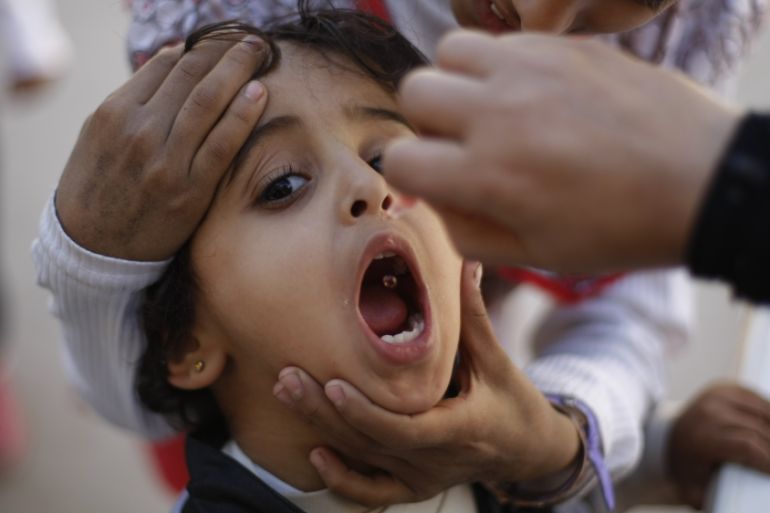Yemen’s health situation ‘disastrous’, officials say
Doctors are grappling with an outbreak of disease in Aden, including dengue fever, which has already killed 144 people.

Al-Mukalla, Yemen – Health officials in Yemen’s war-torn city of Aden made fresh calls on local and international aid organisations for more medical supplies as cases of dengue fever in the city ratcheted up to more than 4,000, according to local health sources.
“[Aden’s] Crater district is a hotbed for dengue mosquitoes, as many terrified families fled their homes there, leaving behind uncovered drinking water,” said al-Khedhar Nasser Laswar, director of the province’s Ministry of Health office.
Keep reading
list of 4 itemsDeadly Sahel heatwave caused by ‘human-induced’ climate change: Study
Woman, seeking loan, wheels corpse into Brazilian bank
UK set to ban tobacco sales for a ‘smoke-free’ generation. Will it work?
Laswar added that 4,623 people have contracted the disease amid a chronic shortage of medical supplies that could have helped contain its spread. Already, 144 people have died.
Yet, for many health workers in Aden, the challenge to curb the disease begins not with treatment, but with diagnosis.
“Is it malaria? Some cases are positive. Is it dengue fever? Some are also positive,” said Dr Abdulnasser Alwali, who chairs the Higher Medical Public Committee in Aden. “We have no labs, equipment, or the means to make such diagnoses.”
Related: Can Yemen’s ailing health system be cured?
Since March, Houthi-backed forces loyal to former President Ali Abdullah Saleh have been battling the forces of President Abd-Rabbu Mansour Hadi, who fled to Saudi Arabia last March, as well as some armed Islamists and south Yemen separatists in the city.
The fighting has claimed hundreds of civilian lives, but has also sapped the city’s medical facilities of its resources and personnel, many of whom fled Aden alongside residents trying to escape the fighting.
![Tightened blockades by the rebels and fierce fighting across the city have prompted most medical officials to either stay indoors or flee [REUTERS]](/wp-content/uploads/2015/06/d8fb2b871ac448489fa000670baed34c_18.jpeg)
Now, as rubbish piles line the streets and abandoned containers of water beckon mosquitoes, remaining health officials say they are seeing cases of acute fevers that they are unable to diagnose.
“Hospitals have become congested with patients who present acute fever of unknown etiology on top of those who are dying from dengue fever and typhoid,” said Alwali.
The uncertainty over what it is, exactly, that health officials should be treating has caused growing alarm. “The health situation in Aden is disastrous,” added Alwali.
Aref Ahmed Ali, a coordinator of the country’s malaria control programme, urged international health organisations to provide health centres with the necessary supplies to diagnose these cases.
“We do not know whether these fevers are coronavirus or something else,” he said. “We have some cases of people dying 24 hours after becoming infected with fever.”
In Aden, resources have been depleted to the point where, according to Alwali, patients seeking treatment at some health centres find that there are “simply no beds” available for them.
Officials are calling for new medical supplies, yet at some centres, even space has become a precious resource.
In the southeastern province of Hadramout, where thousands of internally displaced people live, a local health official said that at least a dozen dengue fever cases have been recorded in some densely populated neighbourhoods in the province’s capital, al-Mukalla.
He added that many people were also diagnosed with the disease in remote areas across the large province.
Riad al-Juriri, director of the Hadramout’s office of the Ministry of Health, urged local and international aid organisations to assist in disease control and prevention.
|
|
Complicating the situation in Aden is the ongoing fighting in the city. Bloody confrontations have forced thousands of families to desert their homes, and have also impeded doctors and medical personnel from doing their jobs.
Laswar said that medical officials have been unable to reach districts infected with the disease, since these areas are under the control of Houthi fighters. “Sixty percent of health staff are absent because they cannot reach the hospitals or were forced to leave Aden with their families,” said Laswar.
“We are in dire need of intravenous fluids, mosquito nets, and malaria drugs.”